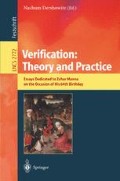Abstract
We investigate extensions of the Dolev-Yao model of a passive intruder into a cryptographic protocol by some algebraic properties of cryptographic primitives. We provide sufficient conditions under which the intruder deduction problem is decidable in polynomial time. We apply this result to the equational theory of homomorphism, and show that in this case the intruder deduction problem is linear, provided that the messages are in normal form.
Access this chapter
Tax calculation will be finalised at checkout
Purchases are for personal use only
Preview
Unable to display preview. Download preview PDF.
References
R. Amadio and W. Charatonik. On name generation and set-based analysis in the Dolev-Yao model. In Proc. CONCUR’ 02, volume 2421 of LNCS, pages 499-514, 2002.
Y. Chevalier, R. Kuester, M. Rusinowitch, and M. Turuani. An NP decision procedure for protocol insecurity with XOR. In Kolaitis [9], pages 261-270.
J. Clark and J. Jacob. A survey of authentication protocol literature, 1997. Available via http://www.cs.york.ac.uk/~jac/papers/drareview.ps.gz.
H. Comon and V. Cortier. Tree automata with one memory, set constraints and cryptographic protocols. Theoretical Comput. Sci., 2003. To appear.
H. Comon-Lundh and V. Shmatikov. Constraint solving, exclusive or and the decision of confidentiality for security protocols assuming a bounded number of sessions. In Kolaitis [9], pages 271-280.
N. Dershowitz and J.-P. Jouannaud. Rewrite systems. In J. van Leeuwen, editor, Handbook of Theoretical Computer Science, volume B — Formal Models and Semantics, chapter 6, pages 243-320. Elsevier Science Publishers and The MIT Press, 1990.
D. Dolev and A. Yao. On the security of public key protocols. IEEE Transactions on Information Theory, 29(2):198–208, 1983.
N. Durgin, P. Lincoln, J. Mitchell, and A. Scedrov. Undecidability of bounded security protocols. In Proc. Workshop on formal methods in security protocols, Trento, Italy, 1999.
P. Kolaitis, editor. Eighteenth Annual IEEE Symposium on Logic in Computer Science, Ottawa, Canada, June 2003. IEEE Computer Society.
Z. Manna and A. Pnueli. On the faithfulness of formal models. In Mathematical Foundations of Computer Science, volume 520 of Lecture Notes in Computer Science, pages 28-42. Springer-Verlag, 1991.
D. McAllester. Automatic recognition of tractability in inference relations. Journal of the ACM, 40(2):284–303, 1993.
M. Rusinowitch and M. Turuani. Protocol insecurity with finite number of sessions, composed keys is NP-complete. Theoretical Comput. Sci., 299(1–3):451–475, 2003.
G. J. Simmons. Cryptoanalysis and protocol failure. Commun. ACM, 37(11):56–65, Nov. 1994.
SPORE: The Security Protocol Open Repository. Available at http://www.lsv.ens-cachan.fr/spore/.
M. Tatebayashi, N. Matsuzaki, and D. B. Newmann. Key distribution protocol for digital mobile communication systems. In G. Brassard, editor, CRYPTO’89, volume 435 of Lecture Notes in Computer Science, pages 324-334. Springer-Verlag, 1989.
Author information
Authors and Affiliations
Editor information
Editors and Affiliations
Rights and permissions
Copyright information
© 2003 Springer-Verlag Berlin Heidelberg
About this chapter
Cite this chapter
Comon-Lundh, H., Treinen, R. (2003). Easy Intruder Deductions. In: Dershowitz, N. (eds) Verification: Theory and Practice. Lecture Notes in Computer Science, vol 2772. Springer, Berlin, Heidelberg. https://doi.org/10.1007/978-3-540-39910-0_10
Download citation
DOI: https://doi.org/10.1007/978-3-540-39910-0_10
Publisher Name: Springer, Berlin, Heidelberg
Print ISBN: 978-3-540-21002-3
Online ISBN: 978-3-540-39910-0
eBook Packages: Springer Book Archive

